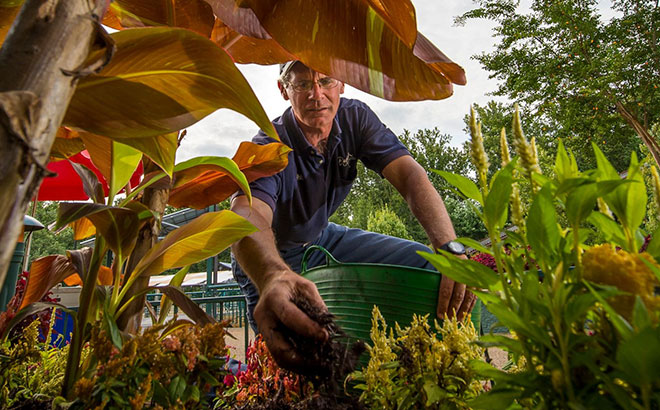Composting: Turning Food Waste into Rich Soil

Did you know that in 2016 SeaWorld and Busch Gardens recycled more than thirteen thousand tons of waste, including food scraps and landscape clippings? Behind the scenes in many locations, we collect organic waste for composting or reuse as mulch. Compost and mulch is a great way to support award-winning horticultural efforts while being good stewards of eco-friendly waste management.
Even at home composting is a great way to lessen your carbon footprint, cut down on the amount of garbage arriving at landfills, and create a healthy batch of soil that can be used in your yard or garden. Many cities and counties have resources about how to start a composting program for your own home, and some locations even offer free tools to get started.
What should I to compost?
- Fruits and vegetables
- Egg shells
- Coffee grounds and tea bags
- Paper products such as shredded newspaper, paper and cardboard
- Organic clippings such as leaves, grass clippings, yard trimmings and house plants
What shouldn’t be composted?
- Meat, bones and fish scraps should not be included in your compost pile unless you have tools specifically designed for breaking down meats.
- Weeds of diseased plants should not be included in your compost to avoid inadvertently spreading seeds or diseases to your garden.
- Pet waste should not be included in any compost that is intended for food crops.
- Yard trimmings or food rinds such as banana or orange peels that may have been treated with pesticides should be excluded, as any lingering pesticides may kill beneficial composting organisms.
Compost piles can be made in your backyard or in an indoor location using a specialty bin. Some maintenance is required, including occasional watering. Compost should also periodically be stirred or turned over to aerate and encourage decomposition. Once the resulting soil is crumbly and has an earth aroma, it can be harvested and distributed into your garden spaces. Compost can take several months to complete the decomposition process, but is a relatively easy way to make a positive environmental impact from home.
For more resources, including step-by-step instructions on creating a compost pile, check out some of these great resources:
United States Environmental Protection Agency (EPA): Composting at Home >
City of Orlando: Composting Guide >
